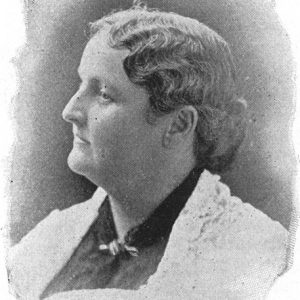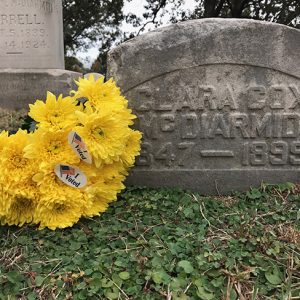calsfoundation@cals.org
Clara Alma Cox McDiarmid (1847–1899)
Clara Alma Cox McDiarmid was Arkansas’s foremost nineteenth-century women’s reformer. She supported suffrage, temperance, women’s education, and the women’s club movement. Active locally and nationally and concerned about women’s inequalities under the law, she also supported cultural activities in Little Rock (Pulaski County) and farther afield.
Clara Cox was born on December 11, 1847, the second of six children in a prominent Noblesville, Indiana, family. Her father’s mother was renowned preacher Lydia Sexton of New Jersey, the first female chaplain for Kansas State Prison. Her mother was Catherine Rowan Allison of Ohio. Her father, John Thomas Cox of Ohio, was a surveyor who moved his family to Coffey County, Kansas, in 1857, where he laid out the town of Ottumwa, Kansas.
Cox, who attended Ottumwa Christian College, was working as a schoolteacher when she met George W. McDiarmid, himself of a wealthy background. He was serving in the Union army and was in Ottumwa in 1865. On August 27, 1866, they married in Little Rock, where he was then garrisoned. Cox was eighteen. The couple had three children. Their two daughters died in 1871, while the youngest child, George, went on to become an attorney. In 1869, McDiarmid began to buy and sell real estate, both on her own and with her husband, who was serving as Pulaski County clerk.
The two were extreme Republicans, abolitionists, and supporters of full equality. Many found McDiarmid’s outspokenness distasteful, but such opinions were in tune with her background: a temperance and abolitionist grandmother, a former Whig newspaper-editor father, and a husband who led African-American regiments in the Civil War. Susan B. Anthony’s widely reported July 4, 1865, speech delivered in Ottumwa—calling for true universal suffrage, by which all adult men and all adult women would have the vote and presaging the struggle for women’s suffrage in Kansas in 1867—likely impressed the couple.
After he lost reelection in 1872, McDiarmid’s husband established a government claims and real estate agency. Around 1880, McDiarmid took charge of the business because of her husband’s deteriorating mental state; he was judicially declared insane in 1887.
In 1889, McDiarmid supposedly began law studies when she accompanied her son to Ann Arbor, Michigan, but there is no record of her registering; she does seem to have attended some classes unofficially. Despite many statements to the contrary, no evidence has emerged showing that she ever qualified as an attorney.
By 1888, McDiarmid had established herself as a reformer. She first headed the struggle for suffrage in Arkansas in February 1888 as founding president of the Little Rock Suffrage Association. She was already an officer of the local Woman’s Christian Temperance Union (WCTU), for which she became state treasurer that June. In 1891, the Women’s Educational Aid Society elected her president, and she represented it in 1897 during the founding of the Arkansas Federation of Women’s Clubs (AFWC). She supported these causes for the rest of her life.
Arkansas women benefited from McDiarmid’s leadership. Susan B. Anthony visited Little Rock in February 1889. McDiarmid’s building at 313–315 Markham Street served as a free headquarters for the WCTU and suffrage groups from December 1889. She gave Arkansas a national presence as one of several state delegates to the Chicago, Illinois, WCTU convention in 1889; at National American Woman’s Suffrage Association (NAWSA) conventions in 1890 and 1891, and at the National Woman’s Council that year. In 1892, she became treasurer of the NAWSA’s new Committee on Southern Work. That year, she also participated in the first Mississippi Valley Suffragist Conference.
Culturally, McDiarmid took part in the Chautauqua educational movement, both locally and in New York State, while from 1892 to 1893, she worked for the Arkansas WCTU and the state women’s committee for the World’s Columbian Exposition in Chicago in 1893.
McDiarmid traveled extensively across the United States, Mexico, and Europe. In 1895, she was a delegate at the WCTU world convention in London, England. Her election to the Special Legislative Committee of the AFWC in 1899 demonstrated her particular concerns. Her articles on women’s status under the law appeared in the Woman’s Chronicle and elsewhere. She wrote and spoke on Alaskan women and the law after her visit there in 1891.
McDiarmid died of unknown causes on July 22, 1899, while visiting relatives in Des Moines, Iowa. At her funeral, her eulogist praised her cheerful disposition and her commitment to improving the status of women and helping the poor. The AFWC paid tribute to her in 1900. She and her two daughters are buried in Oakland-Fraternal Cemetery in Little Rock.
For additional information:
Cahill, Bernadette. “Carved Only with Her Name: Clara McDiarmid and Woman Suffrage in Arkansas.” Pulaski County Historical Review 64 (Summer 2016): 69–73.
Copeland, Salena G. “Clara Cox McDiarmid, Arkansan Suffragist and Lawyer.” Paper written for Spring 2006 “Women’s Legal History” course. On file at Stanford University Libraries, Stanford, California.
Taylor, Elizabeth A. “The Woman Suffrage Movement in Arkansas.” Arkansas Historical Quarterly 15 (Spring 1956): 17–52.
Wilkerson, Jane A. “Little Rock Woman’s Christian Temperance Union 1888–1903.” MA thesis, University of Arkansas at Little Rock, 2009.
Bernadette Cahill
West Monroe, Louisiana
 Civil Rights and Social Change
Civil Rights and Social Change Post-Reconstruction through the Gilded Age, 1875 through 1900
Post-Reconstruction through the Gilded Age, 1875 through 1900 Clara McDiarmid
Clara McDiarmid  Clara McDiarmid Gravesite
Clara McDiarmid Gravesite 



Comments
No comments on this entry yet.